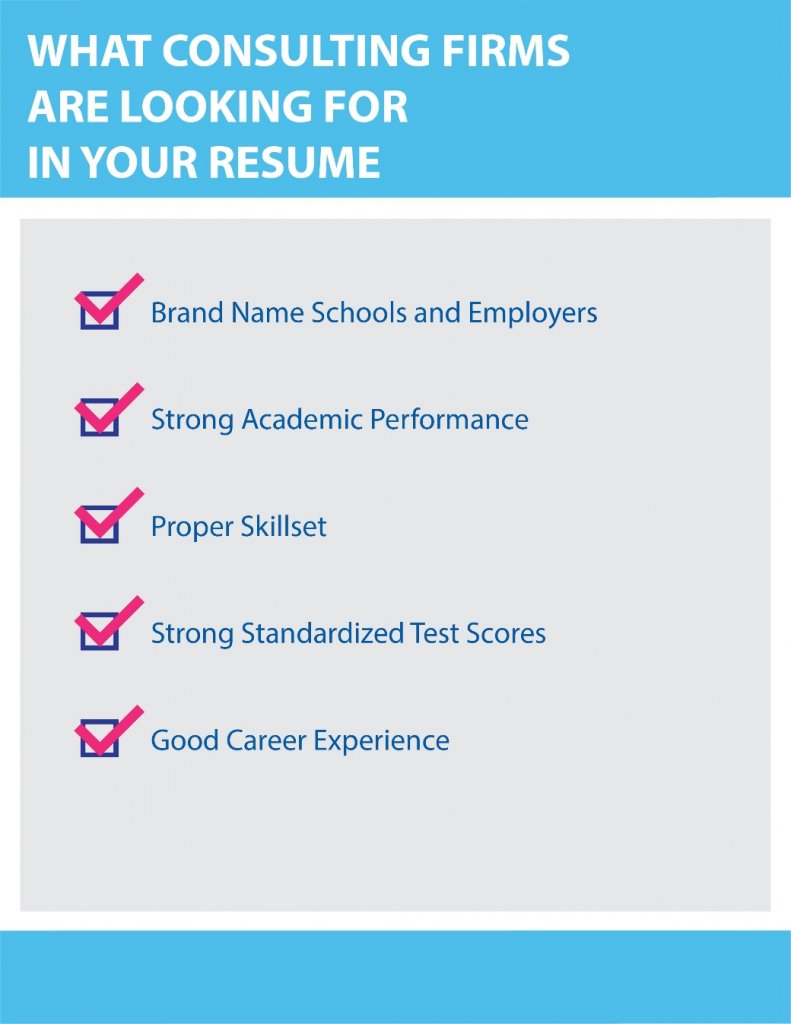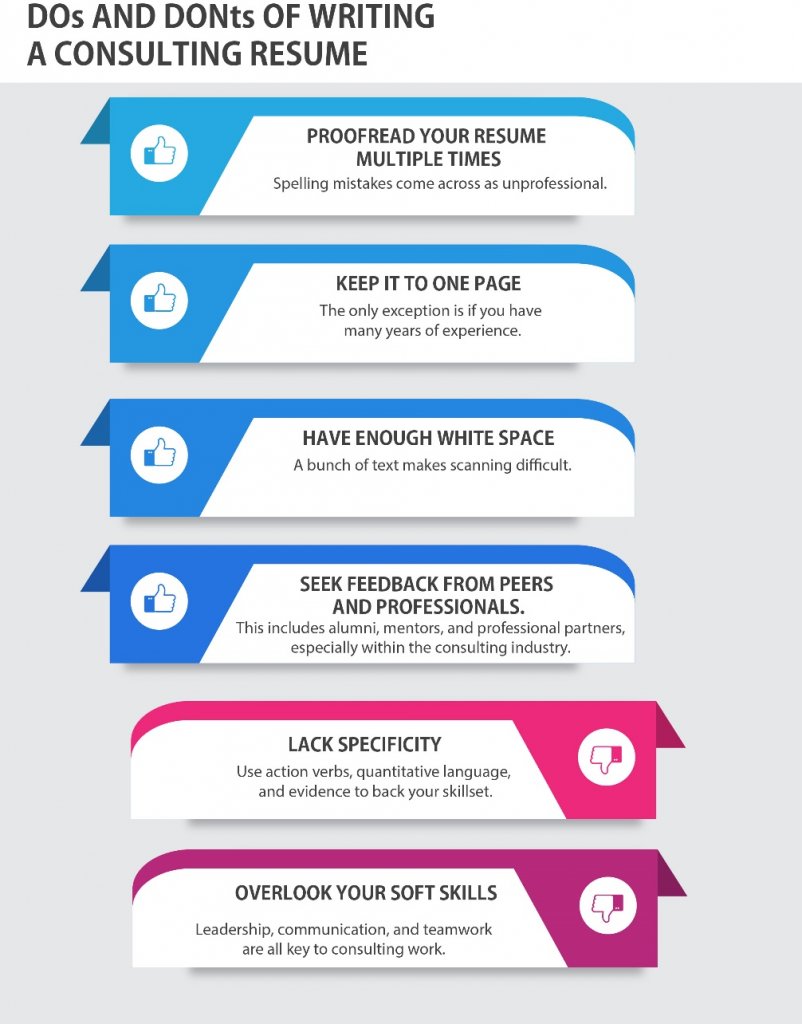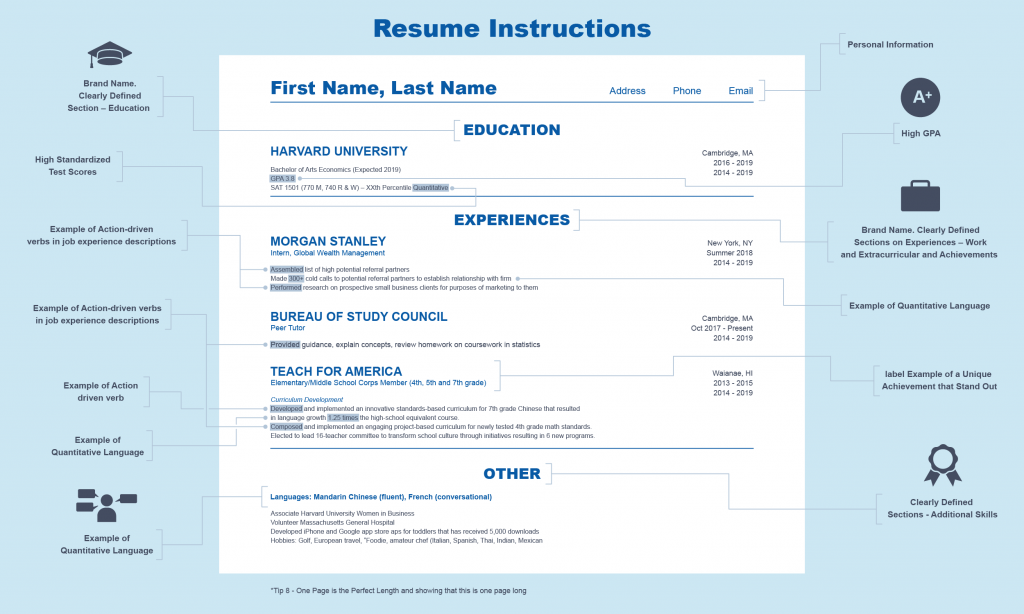For almost any professional job, applicants are required to provide a resume and cover letter to demonstrate their qualifications. Your resume is one of the most important documents during the application process, as it acts as a summary of your education, experience, and skillset.
In the consulting world, your resume is even more important. The top three consulting firms — McKinsey, Bain, and BCG — have acceptance rates of less than five percent during any given year. The resume screening step is where most applicants are eliminated. This goes to show just how important it is to write a strong consulting resume when applying to be a consultant.
FREE Resume Tips Email and Video Series
This form collects your name and email so that we can add you to our email list that delivers the free resources you are requesting. Check out our privacy policy for details on how we protect and manage your submitted data.
We’ll never spam you or share your email. Unsubscribe at any time.
A management consulting resume is different from your standard resume. The difference is not just in terms of format, but content, style, and overall approach. You probably know that the role of a consultant encompasses many different skillsets. A management consultant is a problem-solver, a data expert, and a communications professional, all bundled into one. Because consultants handle complex tasks using many different approaches, firms will be looking at your resume to determine if you have what it takes to be a successful hire. So, what goes into writing the perfect consulting resume? This piece will cover four essential guidelines that you should follow when preparing your resume for a consulting opportunity. By following these steps, you will be in a much better position to impress your employer and secure an interview.
1. Understand What Consulting Firms Are Looking for in Your Resume
In order to write a resume that will get you the interview, you must understand what top consulting firms look for when reviewing candidate applications.

These top firms care less about the proper format than they do about the qualifications and accomplishments that each candidate has. During resume screening, top consulting firms will pay attention to the following components of your resume:
- Brand Name Schools and Employers
The truth is that top consulting firms do care about which schools you attended and which employers you’ve worked for. They have a strong bias for brand name schools and employers that stand out to them and their clients. In fact, it’s the attention that the clients of the firm give to brand name schools that cause the interviewer to pay the same attention to your education background.
It’s not uncommon for a client seeking consulting services to be charged over $500,000 a year. As you would expect, such clients would want to ensure that any consultants working on their project are adequately qualified. Boasting a BS from Yale or an MBA from Harvard certainly adds points, even as a junior consultant working on a major project.
This doesn’t mean that you can’t get a consulting position if you went to a non-target school. However, if you have such brand names on your resume, make it easy for people to see.
- Academic Performance
Consulting firms also pay attention to academic performance. They want to know how you rank in your class and whether you have what it takes to tackle complex consulting projects. Therefore, include your GPA to differentiate your resume from others.
MBA applicants should include their GMAT scores and MBA GPA to be easily seen on their resume.
- Specific Skills Relevant to the Profession
Top consulting firms want to know that you have soft skills, including leadership and communication. While working in the profession, you will need to be able to handle difficult personalities, lead a team, and communicate important information in a manner that people can easily understand. Therefore, make sure you list experiences that demonstrate any leadership and communication experience, among other essential skills.
Activities that demonstrate such skills include job and internship responsibilities, extracurricular activities, and specific experiences that speak to these skills.
- Standardized Test Scores (Especially in Math)
Because grading can vary from one institution to another, top consulting firms would like to see your performance in standardized testing. High performance further strengthens your academic qualifications and shows consulting firms that you have what it takes to be a successful hire. Make sure you include high SATs, GRE, GMAT, MCAT, or LSAT scores in your resume.
- Career Experiences
Consulting firms want to see your career experiences, accompanied by what you achieved during your time in each position. Remember that these firms compare how long your career was with how much you achieved. You may need to show more accomplishments after working for eight years compared to one year.
Regardless of the number of years in a position, follow an achievement-based approach when describing your job. This means emphasizing outcomes, quantifying them, and highlighting parts of your job that apply most specifically to the consulting position in question
2. Properly Format Your Resume
Knowing what top consulting firms expect from your resume, is just the beginning of resume writing. While it does form a solid foundation to build upon, you should also know how to present your academic, professional, and extracurricular skills in a consulting resume.
A lot of this comes down to proper formatting. And by formatting, I don’t mean margins, font size, and columns. Rather, proper formatting refers to presenting your qualifications in a manner that the resume screener can easily identify.
Here are key points to remember when formatting your resume.
- Emphasize Brand Names
Make sure the brand name schools you attended, or big companies that you interned with, are clearly mentioned near the top of your resume. Have them in a bold font right after the name and contact information section.
- Proudly Display a High GPA
Along with brand names, include your high GPA right next to the school and program information. Remember that resume screeners are doing just that: screening your resume. If you make your distinguishing qualifications hard to find, you may be overlooked.
- One Page Does the Trick
This is perhaps the biggest caveat to consulting resume writing. How do you condense so many experiences and qualifications into just one page?
Starting early is key. Take time to reflect on your most relevant experiences, how you’ll allocate bullet points, and how you can play around with margins and line spacing to fit everything on one page. While this may sound challenging, it’s possible — unless you have many years of experience across multiple fields (which you can extend to a second page).
- Have Clearly Defined Sections
A typical consulting resume should be split into five clearly defined sections:
- Personal Information
- Education
- Work Experience
- Extracurricular Experiences and Achievements
- Additional Skills
While you don’t have to follow this format religiously, make sure the information you include covers all sections mentioned above. More importantly, don’t forget about your extracurricular achievements. This section gives you the opportunity to demonstrate important skills such as leadership, teamwork, and entrepreneurship.
- Use Action-Driven Verbs
When your resume is being screened, you have only seconds to attract the attention of your resume screener. So, it is essential that you give some thought to word choice. Start each bullet point with an action verb such as “lead,”“initiated,”“solved,”“saved,” etc. This will attract attention to your specific achievements and make you stand out from other applicants.
- Emphasize Language Skills
If you can speak multiple languages, you may stand out to consulting firms. A firm may view you as an asset for a specific market they’re targeting. Because consultancy is becoming global in today’s world, being fluent in more than one language can set you apart from other applicants.
- Keep It Simple
Remember that not all resume screeners are familiar with your specific field of work. Therefore, avoid industry-specific jargon when describing your accomplishments. Simplify this information in a manner that anyone can easily understand when reading through your resume.
- Demonstrate a Variety of Skills
Avoid falling victim to writing an incomplete resume. How could this happen? If you’ve been working as an engineer for many different companies, don’t include the same job responsibilities repeatedly throughout your resume. Instead, highlight unique experiences that demonstrate your diverse skillset. More importantly, emphasize your achievements rather than your daily responsibilities.
- Use Quantitative Language
The consulting field is driven by data. Numbers, quantities, and other similar information can attract attention to your skillset. As you outline achievements in your professional career, present them using quantified data backed by numbers.
For example, you could state how you developed a quality management system that resulted in lower production costs, from $40 per unit to $30 per unit (or something similar).
3. Stand Out from the Crowd
As you write a consulting resume, remember that you’re looking for any opportunity to stand out from thousands of other applicants. Similarly, resume screeners are looking for what makes you different.
Personal accomplishments such as distinguished scholarships, Olympic medals, or presidential honors can be the accomplishment that sets you apart from another similarly qualified candidate.
If you’ve done smaller, yet unique activities that others haven’t done, also include these in your resume. The goal is to take every opportunity to stand out from the competition.
4. Avoid Making Simple Mistakes
As you finalize your consulting resume, make sure you keep the following Dos and Don’ts in mind. These pointers can help you avoid common, easy-to-prevent mistakes so that you can submit an outstanding resume.
- DO: Proofread your resume multiple times.Spelling mistakes come across as unprofessional.
- DO: Keep it to one page. The only exception is if you have many years of experience.
- DO: Have enough white space.A bunch of text makes scanning difficult.
- DO: Seek feedback from peers and professionals.This includes alumni, mentors, and professional partners, especially within the consulting industry.
- DON’T: Lack specificity.Use action verbs, quantitative language, and evidence to back your skillset.
- DON’T: Overlook your soft skills.Leadership, communication, and teamwork are all key to consulting work.

As you can see from these tips, writing a consulting resume is different from a standard resume for other types of jobs. A consulting resume requires attention to detail, focus on your unique skillset, succinct language, and an achievement-based approach. Writing the perfect consulting resume is not as easy as many people think. It takes lots of time and attention.
Resume Example
Here is an example resume that highlights the tips I’ve mentioned. Reference this example as you create your resume to make sure that you hit all of the important sections. With the exception of your brand name schools/employers and GPA, these items do not need to appear in the order I have them listed. But, make sure that they are all represented in your resume.
Below is an example consulting resume. You can also download the example by clicking here.

More Resources:
FREE Resume Tips Email and Video Series
This form collects your name and email so that we can add you to our email list that delivers the free resources you are requesting. Check out our privacy policy for details on how we protect and manager your submitted data.
We’ll never spam you or share your email. Unsubscribe at any time.




127 thoughts on “Consulting Resume – The Ultimate Guide on How to Write the Perfect Consulting Resume”
Hi Viktor, thanks for the great article. I agree that all these factors make the results quite predictable. On the other hand side a big plus is always personality; whenever you can transmit that it gives you a great impact…
Hi Victor,
I am currently pursuing my Masters of Science degree in Information Technology from the Hong Kong University of Science and Technology. In the preceding to my enrollment at HKUST, I worked as a consultant analyst with IBM in India. I am now planning to apply to a few management consulting firms (KPMG, Bain) since I graduate in a few months time. I have a weak GPA (< 3.5/4) and scored 320/340 on the GRE. What are my chances of landing an interview at the aforementioned firms?
Also, I will be applying to IBM for a management consulting post. Will my prior experience of working with them in India put me in a better position than other candidates inspite of my relatively inferior academic performance?
Thanks,
Avi
Hi Victor,
I have been using your resources (including Resume ToolKit) for some time found it very useful. Thanks for the great service you are doing. I’m a PhD candidate in a Top Australian University and I’m planning to apply for BCG, Bain, and Accenture firms in Australia.
1. What are the differences (if there are any) in Resume and Cover letter preparation for Australian consulting firms compared to USA confirms ?
2. Can I mention about my PhD in two sections of the Resume : Education section as an academic qualification and Experience section as a demonstration of problem solving and analytical skills.
Thanks so much.
Daniel,
For a PhD you can use a full length academic PhD including all publications (no page limit on CV) or resume. In a resume, you can list it twice but avoid making it redundant. In experience you might focus on your research or teaching duties, in education on dates of attendance relevant test scores in your country and the like.
Victor
Hi Victor,
I’ve recently applied to MBB for summer internships and I didn’t even get an interview! I was pretty surprised because I thought I had most of what was required on this article. I have a little under a 3.8 GPA from an Ivy, and I’m a double major in the hard sciences. I have a 750 Math SAT. I have extracurriculars on campus that show leadership. The particular one I’m in is very time consuming and maybe that wasn’t enough just to have one? I have experience in a research lab and I networked with some people who I knew from the firm (some other people I know who had lower GPA didn’t network at all and still got an interview at one of the firms).
I don’t know where I went wrong!
Do you have any thoughts?
Thanks,
Mark
Mark,
It’s impossible to know for sure. At the end of the day, a human being makes the decision and they are not 100% predictable.
My best guess in no particular order:
1) resume was not formatted in ideal way such that your vitals stats were actually noticed in the first 5 seconds / the bullet points didn’t use the optimal phrasing of your extra curricular or work experiences
2) your cover letter looked just like everybody else / didn’t highlight your vitals in the first paragraph / didn’t name drop any big brand names / didn’t reference people you met at the firm you applied to
3) your networking wasn’t strong enough such that someone you met informally endorsed you behind the scenes.
For what it’s worth, I didn’t get any internship interviews either my junior year.
Good luck,
Victor
Hi Victor,
Thank you for your great articles. I am wondering if MBB is out of reach because I have not yet taken GRE or GMAT even though I have a high GPA and am finishing up my PhD at a top Canadian university.
Regards,
Hanyue
Hanyue,
Not necessarily. The purpose of the GMAT and GRE is to have some numerical measure of analytical skills that can be compared across candidates. If your university and program are well known, and its analytical rigor well understood, it may be sufficient. McKinsey may ask you to take the McKinsey Problem Solving Test — a kind of consulting version of the GMAT to test your quantitative abilities.
If you have a high GPA and a school the MBB firms recognize as a target school and your PhD is in a technical field, the lack of a GRE wouldn’t be a deal breaker
Victor
Hi Victor,
Thanks for your guidance. I am PhD candidate in biotechnology at Rensselaer Polytechnic Institute, GPA :3.9/4. GRE: 800/800 in Quant. (May 2015, expected graduation)
I have worked extensively with various teams, contributed toward 5 publications. Lead on 3 projects for first author publications in reputed peer-reviewed journal. Filed 2 patent applications. Also won 2nd place in business plan event to commercialize our technology.
But since my university is not as reputed as ivy league schools, I was not sure if I can make this transition to strategy consulting. Also I do not have an MBA or other formal business degree. Please advise if I should focus on the top firms or next tiers? Any suggestions from you would be highly helpful. Thanks a lot, Best Regards,Ruchir Mundra
Hi Victor,
I will be attending either LBS/Insead/Kellogg for my MBA next fall and was wondering if you could help provide some feedback/guidance on getting into MBB. My background is: 700 gmat, 3.44/4.0 at a US state school, 4 years working in sales & marketing roles. Does MBB have minimum gmat requirements? Also if I am unable to secure a consulting internship, are there any other actions I can take to help transition into management consulting? Greatly appreciate any suggestions you have. Thanks.
Hi Victor-
Thanks for all the great comments. I’m wondering if MBB is a possibility for me- I graduated with a 3.3 gpa from Emory and majored in Economics/Math. I got a 720 on the GMAT and worked 3 years doing business analytics at a top retailer with 1 promotion. I just joined the Peace Corps to gain some international/volunteer experience and plan on attending a top 15 MBA program after. For MBB I am concerned about my undergraduate GPA but would definitely welcome the opportunity to work in an international office if that helps my chances.
Thanks!
Steve,
Realistically, MBB is out of reach with that GPA especially from a non target school. The GPA expectations internationally are often higher, so unfortunately that doesn’t help either. I would suggest targeting the next two tiers of firms.
Victor
Hi Victor,
You inspired me a lot. Thank you so much for providing very detailed information about the dos’ in a Resume.
I am a Master’s student (Industrial Engineering) at UIUC. I am looking for summer internship in consulting firms. I graduated from Government College in India. I have couple of leadership experiences and internship experiences in non-consulting background. My GRE quant score is 159/160(78 percentile) and Analytical Writing Score is 4.5/6.0. In my undergrad, I was in the top 7% of the class. What can I do to have a career in consulting? Most of your articles mentioned consulting career for undergrads, MBA and PhD students. What is the scope for a Master’s student like me? I recently got an email from our graduate coordinator about internship opportunities in Mckinsey. Could you please suggest the points I should emphasize in my Resume? Do I stand a chance to be considered for the internship?
Thank you
P. S: Thanks much for your book. I just got that and it is awesome!
Hi Victor,
I obtained a PhD from MIT Aerospace but my GRE was not the highest when I initially applied (Q700/800). How much do you think this will work against me when applying to MBB? Should I re-take the GRE just for boosting the numbers? Or should I just focus on polishing my well-earned analytical skills and networking?
John,
A PhD in Aerospace from MIT qualifies you do add, subtract, multiply, divide, and calculate percentages which is 90% of the math used in consulting. At this point, I wouldn’t worry about the GRE score. Make contacts via networking. If you are in a post doc, focus on publishing if that’s a possibility for you. The general rule of thumb is firms want to see an upward sloping career trajectory.
Victor